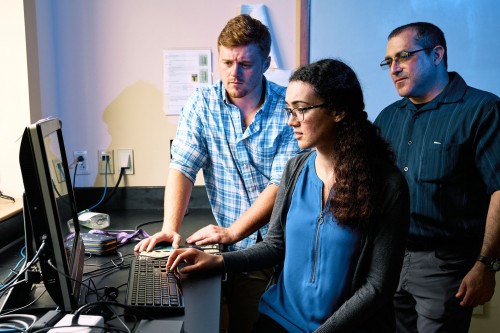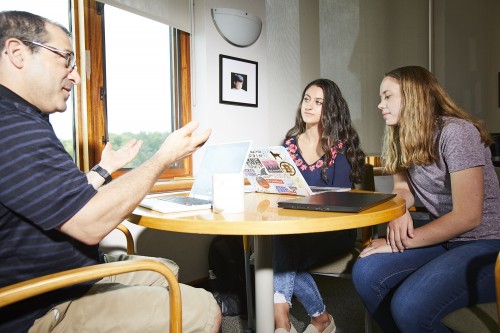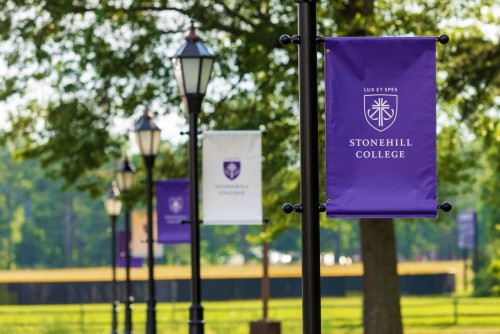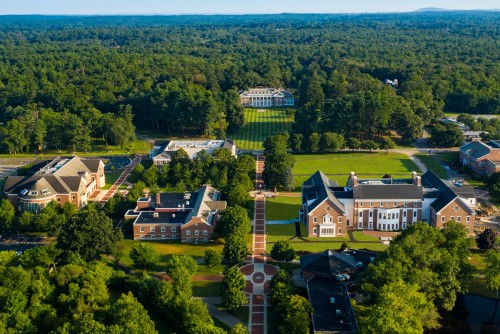The Politics of Climate Change Through a Feminist Lens
Student, professor probe issues of inequality as Palestinians navigate challenges in a rapidly changing environment.
A Palestinian citizen of Israel, Professor Anwar Mhajne recently completed one of her regular trips to the Middle East, where she was struck by the region’s climate change challenges.
The Political Science & International Studies faculty member was inspired to pursue a Stonehill Undergraduate Research Experience project focused on this issue. She and Taylor Sprague ’23 spent summer 2022 exploring the impact of weather changes on the people of Palestine through the lenses of politics, feminism and climate science.
“Palestinians will really experience the effects of climate change, especially in Gaza, where Israel and Egypt have set up a blockade,” said Sprague, a political science major and criminology minor from Dover, New Hampshire. “It’s difficult to get goods across that barrier. Palestine can’t update their infrastructure to combat climate change because they don’t have access to the materials they need.”
The student and her mentor conducted their research through a feminist lens hoping to showcase how environmental issues impact social groups differently. Their goal was to trace the connections between climate change, inequality and politics. To that end, the pair conducted interviews with scholars from an array of backgrounds as they probed this complex issue.
“Our focus was on speaking with marginalized voices,” Mhajne said. “We wanted to move beyond baseless ideological arguments regarding the context of Israel and Palestine. We wanted to look at the facts, see what is actually happening over there, and learn how global issues are having significant implications on this specific region.”
Prior to these conversations, Mhajne made a concerted effort to impress upon Sprague the importance of respecting their subjects and approaching interviews ethically.
“There are guidelines we need to follow to protect the interviewees,” Mhajne said. “A lot of the people we’ve reached out to are experts, so they’re public figures. They shouldn’t feel like they’re in a vulnerable position, but you just never know when you’re dealing with a topic like this.”
The insights gained from these scholarly conversations will be presented at the 2024 Women, Climate and Insecurity Conference. This gathering brings academics from various fields together to share feminist analyses of climate change and its effects on marginalized groups.
Taylor Sprague ’23 presents her research to her class.
As she and Mhajne prepare for this conference, Sprague cannot help but feel grateful to be at a college that prioritizes student research and encourages the exploration of issues from an interdisciplinary point of view, such as the intersection of politics, feminism and climate science.
“I’ve always been the type of person who’s interested in a lot of different things,” she said. “For instance, I’ve taken a lot of environmental science classes, even though that’s not my major. During those classes, we focused a lot on environmental policy, which ties in well with my political science and criminology classes. I love that Stonehill allows us to make these connections. That’s the beauty of a liberal arts education.”
Related Stories
-

Two political science students used their summer research opportunity to study identity politics through the lens of ethnicity and socioeconomic status.
-

Student researchers examine the theory and practice of democracy with an eye toward factors that fuel corruption.
-
Request Information
Sign up now to be added to our mailing list, and we will show you how Stonehill could become part of your story.
-
Visit Opportunities
Our visit programs will help give you a better understanding of how Stonehill’s expansive leadership and experiential learning opportunities equip students for success in a rapidly evolving and globally competitive world.
-
Apply for Admission
Stonehill College provides an exceptional learning experience for both undergraduate and graduate students. We invite you to review the process, requirements and application deadlines for our entry options.




